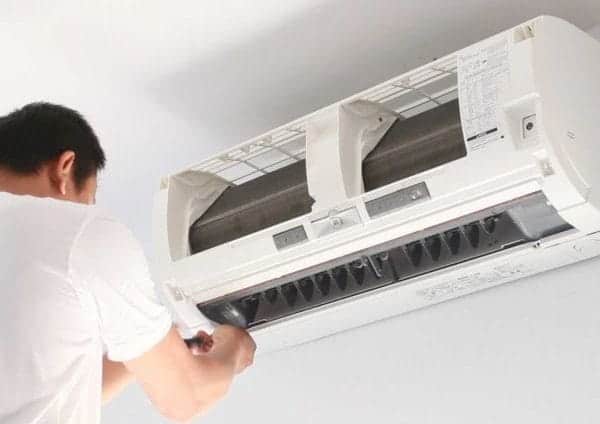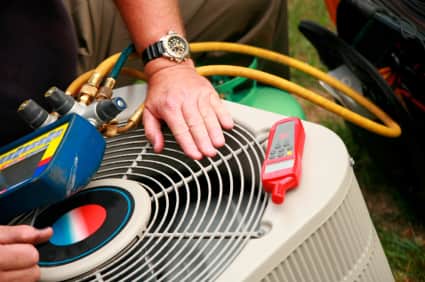If your AC unit is humming but not turning on, it might be because of a dirty filter. A dirty filter will reduce the airflow through the unit and can cause it to overheat.
Check the filter and clean or replace it if necessary. So, Why Is Your AC Unit Humming But Not Turning On? Read this article to find out what the reason is and some solutions.
Let’s begin,
Why is your AC unit Humming But Not Turning On?
If your AC unit is humming but not turning on, there are some potential causes. First, check if the unit is plugged into the outlet and receiving power.
If it is, then the issue may be with the capacitor. The capacitor is a small device that helps start the compressor by providing a boost of energy.
Over time, the capacitor can become damaged or worn out, causing the AC unit to hum but not turn on.
Another potential cause is a faulty relay switch. The relay switch helps to send power to the compressor, and if it is not working properly, the AC unit will not be able to turn on.
If you suspect that either the capacitor or relay switch is to blame, it’s best to call a qualified technician for service.
However, if the unit is receiving power and there doesn’t seem to be an issue with the electrical components, the problem may be with the cooling fans.
The fans help to circulate air around the coils, and if they are not working properly, the AC unit will not be able to cool your home effectively.
What is an AC Capacitor?
An AC capacitor is a device that stores electrical energy in the form of an electrostatic field. Capacitors are used in various electronic devices, including radios, televisions, and computers.
They are also found in many household appliances, such as air conditioners and washing machines.

AC capacitors are made up of two metal plates separated by an insulating material, such as paper or plastic.
When an AC voltage is applied to the plates, an electric field is created between them. This field stores energy that can be released back into the circuit when the voltage is removed.
AC capacitors are typically small and can be found in various voltages and capacities.
How to Tell If Your AC Capacitor Is Bad?
Many homeowners don’t know if their AC capacitor is bad. This can be a problem because a bad capacitor can cause your air conditioner to stop working.
There are a few signs that you can look for that will indicate that your capacitor is going bad. First, you’ll notice that your air conditioner isn’t cooling your home as well as it used to.
This is because the capacitor helps the compressor run, and when it’s not working properly, the compressor can’t do its job effectively.
You may also notice that your air conditioner is making strange noises. This is because the capacitor helps to start the compressor, and when it’s not working properly, the compressor can make a grinding or buzzing noise.
Finally, you may notice that your electric bill is higher than usual. Your air conditioner has to work harder to cool your home when the capacitor is not working properly.
If you notice any of these signs, it’s important to call a professional to have your AC capacitor checked.
What Causes a Capacitor to Go Bad in the AC Unit
A capacitor is an essential component in an AC unit, responsible for storing and releasing electricity to help power the unit.
Over time, however, a capacitor can go bad, causing the AC unit to stop working. There are several reasons why this may happen, including age, corrosion, or damage.
When a capacitor goes bad, it must be replaced to get the AC unit operational again. Depending on the cause of the problem, preventative measures may be able to extend the lifespan of the new capacitor.

For example, if corrosion is an issue, regularly cleaning and Inspecting the AC unit can help to prevent build-up.
In cases of damage, a prompt repair can minimize further damage and help prolong the life of the new capacitor.
By understanding the causes of capacitor failure, homeowners can take steps to prevent problems and keep their AC units running smoothly.
What to do if your AC unit is humming but not turning on
If your AC unit is humming but not turning on, there are a few possible explanations. First, check to ensure that the unit is plugged in and receiving power.
Next, check the thermostat to ensure it’s set to “cool” mode. If the problem persists, it’s possible that the compressor is defective and will need to be replaced.
In any case, it’s best to call a certified technician for AC repair. They will be able to quickly diagnose the problem and get your AC unit up and running again in no time.
How to clean or replace an AC unit filter
One of the most important things you can do to maintain your AC unit is regularly clean or replace the filter.
A dirty filter can reduce airflow and cause the unit to work harder, leading to higher energy bills and reduced efficiency.
A clogged filter can even cause the unit to overheat and shut down in extreme cases. Fortunately, cleaning or replacing a filter is a relatively simple task that can be easily accomplished in a few minutes.
First, locate the filter housing and remove the old filter. If the filter is extremely dirty, you may need to rinse it with water before installing the new one.
Once the new filter is in place, screw on the housing and turn on the AC unit. You should notice an immediate difference in airflow.
Regularly cleaning or replacing your AC unit’s filter is essential for maintaining peak performance.
How often should you clean or replace an AC unit filter?
Air conditioners work by circulating cool air through a home or building. AC units rely on filters to remove dirt, dust, and other airborne contaminants from the air to function properly.
These filters need to be regularly cleaned or replaced to keep the unit running efficiently.
Depending on the type of filter, it may need to be replaced as often as every month or two. However, most filters can be reused several times before they need to be replaced.
To prolong the life of a filter, it is important to vacuum it regularly and avoid exposing it to excessive amounts of dust.
FAQ
Why is my AC unit humming but not turning on?
If your AC unit is humming but not turning on, there are some potential causes. First, check if the unit is plugged into the outlet and receiving power. If it is, then the issue may be with the capacitor. The capacitor is a small device that helps start the compressor by providing a boost of energy.
What should I do if my AC unit starts humming but doesn’t turn on?
If your AC unit starts humming but doesn’t turn on, you should try to thaw out the unit by turning it off and letting it defrost for a few hours. If that doesn’t work, you can check the power supply by looking at the circuit breaker or fuse box. If there is an issue with the power supply, you can try resetting the circuit breaker or replacing the fuse.
Conclusion
If your AC unit is humming but not turning on, you can do a few things. The first step is to clean or replace the AC unit filter.
You should also check to make sure that the power is turned on and that there isn’t anything blocking the airflow to the unit.
If you’ve tried these things and your AC unit is still humming but not turning on, it may be time to call a professional for help.